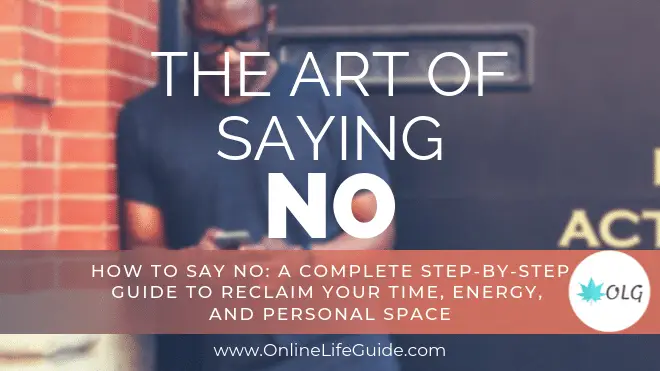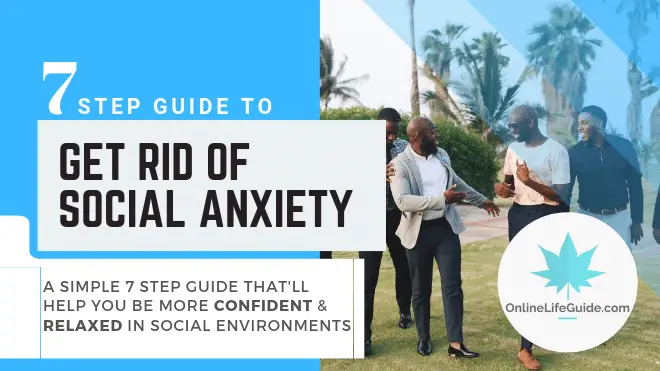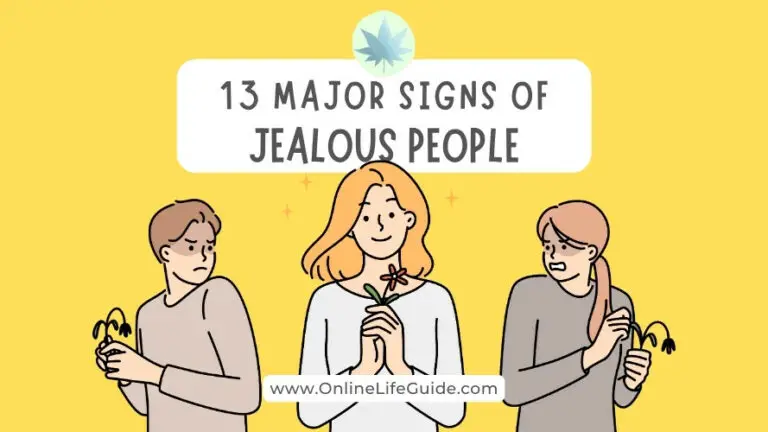How to Say NO without Hurting Someone’s Feelings – 17 Tips That Work!

“The difference between successful people and very successful people is that very successful people say NO to almost everything.”
— Warren Buffet
Always saying yes and agreeing to everything because of social pressure can be draining and exhausting. Have you suffered this “Ummm…yeah…sure…” syndrome? Are you tired of being a YES-Man/Woman?
We have our own life with limited time and so many things to do.
We have our own likings and dislikings. Something that might be exciting for someone else might be a waste of time for us.
We might not feel like doing something, and that’s totally our right to choose NOT to do that thing. Nobody else should force us to do something that we’re not willing at heart (unless it’s for our own greater good).
The only thing that stands between us and a life of freedom is our ability to say NO. Knowing When to say No, Where to say No, and How to say NO.
Throughout our lives, we will constantly encounter such requests, offers, invitations, and interactions where we must decline or refuse to be able to keep harmony in our day-to-day lives.
If you’ve been having difficulty refusing people, learning the art of saying NO will be a great asset in your arsenal. This one simple skill will help you throughout your life whenever you have to stick to your own priorities and stand by your values.
Before we begin, here is what you can expect to learn from this guide:
- How to say No without feeling guilty.
- How to say No without hurting someone’s feelings.
- Boundary setting and prioritizing.
- Developing the Mindset that’ll give you the confidence to take a stand for yourself.
- Specific techniques with examples to communicate your NO effectively.
- A 3 Step Method to formulate an appropriate, polite, yet honest response when you have to say no.
- A simple exercise to boost your confidence to say No in situations when you get under social pressure.
Let’s dive in!
Why is it so Hard to Say No?
Someone calls you and asks you for something that you don’t want to do.
In your mind, you really want to refuse but then all of a sudden “YES, SURE!” comes out of your mouth. And then you regret saying yes and kick yourself over why didn’t you just say NO?!
Does this ever happen to you that you want to say no but end up saying yes?
If that’s the case, you’re not alone. Most of us have experienced situations like these. In fact, many do on a regular basis.
Now it’s good to be a giving hand and be helpful to people, but it’s also important to realize that we have limited time, capacity, and mental/physical energy. If we keep on saying Yes and agreeing to everything, we’ll disrupt the harmony of our lives.
NO is a tiny little word but why is it so hard to say no sometimes? How can we make it natural and effortless to turn things down?
Here are 17 Tips to stop being a people pleaser, take charge of your life, and say NO effectively whenever you want to.
1. Realize That You Don’t Have To Please Everyone
Often it’s so hard to say no because we are trying to please other people and trying to avoid any conflict, disagreement, or making them angry.
On a subconscious level, we are trying to avoid the pain and discomfort that might occur if the other person doesn’t take our refusal positively.
Sometimes, saying no might just seem a bit rude in our own minds, and we don’t want to spoil our “nice” image in front of other people who expect us to act nicely.
Sometimes, it’s just the fear of being too prominent if we stand up for ourselves. The fear of being the odd one out and not getting accepted by people.
A lot of it comes from having lower self-esteem and not valuing yourself and your priorities.
So the first step to making it easier for you to say no is to let go of these burdens of fear and wanting to fit in. Begin to focus on developing your self-esteem.
You are important and worthy! And so are your choices, your likes and dislikes, and your personal space.
Know that your time and your energy are valuable!
Also, realize that saying no doesn’t mean that you’re rude and it does NOT make you a bad person.
2. Realize What’s on Stake
“You have to decide what your highest priorities are and have the courage to pleasantly, smilingly, unapologetically say “no” to other things. And the way to do this is to have a bigger “YES” burning inside.“
— Stephen Covey
When you are asked for a favor, a request, or a meetup, ask yourself,
“Is this really in alignment with my current priorities?”
“Will I be compromising on something important if I say yes to this?”
It will be easier for you to decline when you know what you are going to compromise on if you say yes.
Let’s say your priority is to save up money for something important and your friends ask you to join them for an expensive dinner.
If you are clear about your priorities, you’ll be confident within yourself that spending money on unnecessary things is not the wisest thing to do at the moment.
When someone asks you to hangout or meet up at the coming weekend but you already have a commitment to spend time with your family, don’t be afraid to tell the person that you already have prior commitments or that you spend your Sundays exclusively with your family (if you really do).
You HAVE to say NO at times if you really want to prioritize and get your life back on track.
If you don’t say no to unimportant things, you will have to compromise on the important and valuable things in life.
If you want to say YES to the good and important things in life, you must say NO to many other things that stand in your way. This makes it even more important to practice the art of saying No.
3. Stop Feeling Guilty For Saying NO
The reason why we feel guilty saying no to someone is that we are probably not valuing our time enough or are not clear enough about our priorities.
Certainly, there are times when someone is truly in need and we must go out of our way to help them out and be with them. That is the time to say Yes.
But apart from that, people who take your time for granted and are inconsiderate about you being busy, there is no need to feel guilty saying no in those instances.
You should, in fact, feel proud and accomplished saying no to unimportant things because now you can say yes to the stuff in your life that actually matters.
4. Avoid Giving Too Many Explanations
You don’t always have to give an excuse for saying No.
Often times when you give too much explanation, people tend to argue back to try to convince you.
When you have a genuine excuse, say it precisely. When you don’t have a particular excuse, instead of lying and coming up with fake excuses you can say something like:
“Though I won’t be coming today, I really appreciate your invitation.”
“I may not be able to attend your event but I wish the best for you.”
5. Offer an Alternative
If you are unavailable or unable to help out for some reason but you have a relevant contact, someone who can be of help to this person, refer them.
An example would be:
“I have a contact that I think will be able to help you better than me in this scenario.”
If you think you can manage to fulfill the request on some later day, then just postpone it. For example:
“I won’t be able to meet you tomorrow, but let’s meet up on Saturday afternoon.”
6. Don’t be Apologetic When Refusing
Your time is precious and so are your priorities and values.
You don’t have to apologize for saving your time from something that you don’t want to do, and nor do you have to be sorry for not doing something that is against your personal values.
We have a tendency to say “sorry” often where it is not necessarily needed. Next time commit to standing your ground without being sorry about it.
Be polite, but not necessarily apologetic.
7. Set Boundaries
It all becomes much easier when you have your boundaries clearly defined.
When you are mentally clear about your personal space and personal boundaries, others will begin to notice it and respect it (if they are even half-decent human beings they’ll respect your space and choices.)
Personal Space Boundaries
Have boundaries for your personal space. If you want to spend time with yourself without interruption, so be it. It’s your right!
If you don’t wanna talk about something or don’t want to tell your plans, you can rightfully refuse.
If you don’t like people messing with your personal stuff or going through your smartphone, tell them to stop.
Family Life Boundaries
This is one thing many people struggle with, and because of that, they experience great disharmony in their personal lives.
The matters between you and your spouse MUST stay between you and your spouse (except for the cases that require professional intervention, such as abuse, then you must seek a professional)
Even if your parents, relatives, or your close friends try to be nosy and ask about personal stuff between you and your wife, refuse to tell them straightforwardly. Choose to be loyal to your wife and keep the integrity of your sacred relationship intact.
If someone is being too curious about your family members’ personal lives just for the sake of gossip, tell them that it’s their personal life and you don’t feel comfortable talking about it.
If you intended to spend time with your wife and kids or your parents on the coming weekend, stick to it and say No to anything else that’s in the way.
Professional Boundaries
If you find people trying to take advantage of you for free for something that you usually charge for, tell them to consult you professionally within your work hours and mention your fee. (unless it’s a friend, a relative, or someone with whom you have a mutually symbiotic relationship.)
Also, keep your personal and professional boundaries separate. If a professional contact tries to get too personal and you are not comfortable with it, don’t be afraid to politely mention it.
“Hey I appreciate your concerns regarding my personal life but this is too personal for me and I’m not comfortable talking about it.”
8. Take Your Time
Instead of agreeing immediately, allow yourself some time to think before responding with a yes or no.
This will give you time to rethink your priorities and check your schedule to see if you have other commitments before you commit to this person.
You can say:
“Let me get back to you regarding this”
“Give me some time to think, I’ll get back to you as soon as possible.”
Then make sure to get back to them with whatever your response may be.
9. It’s Not You, It’s Me.
A classic way of refusing without offending the other is to take it on yourself.
One piece of advice though, don’t use this as a cheap trick and superficial play of words. Do it in an honest and genuine way.
If you are a regular reader of my content, you’d have known by now that I don’t usually advocate hollow, superficial tricks which we see often in the modern self-help industry.
You can say statements like:
“Your product is quite nice, it’s just not my cup of tea.”
“Thank you for your offer, I really appreciate it. It’s just that I’m not the right person for it.”
“I would have helped you out with this project but since I’m already so occupied these days, I won’t be the right fit for something this important.”
10. Compliment and Be Appreciative Of The Offer When You Turn It Down
Acknowledging someone’s effort or appreciating their offer makes it easier for you to turn it down in a polite manner.
It will also make it easier for the other person to take No for an answer instead of feeling offended or rejected.
A few examples would be:
“Thank you, that’s so nice of you to remember me and take your time to invite me. I’m afraid I won’t be able to make it due to XYZ…”
“The work that you’re doing is really appreciable. It’s a great initiative. I wish I could contribute towards it but I have too much on my plate right now.”
“It’s an honor for me that you thought of me for this XYZ honorable/noble task. However, with so much going on in my life right now, I really won’t be able to do justice to it.”
11. Don’t Give False Hopes
Don’t give future hopes and get people’s expectations up for you if you don’t intend on doing that particular thing.
Don’t say statements like, “I will think about it” or “I’ll try” if you know within that there is no way you’re going to do that.
Better to be honest and truthful now than to build someone’s expectations and then break them.
This will create a sense of distrust and unreliability for you as a person.
12. Don’t Get Into Moral Pressures
Sometimes we agree to certain things just because of the moral pressure of being generous.
In our minds, we think that if we don’t do it, we might not be perceived as “generous” or a “good person” by other people.
You don’t have to be forced to be generous.
Do the kind deed if you really want to do it from the heart, otherwise, be bold enough to politely refuse.
Just remember, DON’T SAY YES WHEN YOU WANT TO SAY NO.
13. If You Don’t Feel Comfortable Doing Something, Say It!
If you are uncomfortable with someone coming to your house or staying at your place. Mention it.
“I h ate to refuse, but quite honestly, I’m a private person and I’m not comfortable with you visiting my house so often (OR) staying at my place.”
If you are not comfortable lending someone money because you think they might not return it, say it instead of endlessly worrying later about whether that person will return you your money or not:
“I don’t like to lend money. I’m not comfortable lending money to people.”
If you are not comfortable sharing something, just mention it. I know it’s difficult to say. But it will save you the inner discomfort and pain that you feel later on if you try to be too nice.
14. Remember That Being Honest & Saying NO Will Earn You Respect
Value your time, your privacy, and your peace of mind.
When you respect yourself and your time, it is much easier and natural to refuse things that don’t add value to your life and are not worth your time and energy.
When you value and respect yourself and your time while being honest about it, people are subconsciously going to develop respect for you.
Not everybody has the courage to be honest and selective about their time and energy. That’s why most people give in under social pressure.
However, when you start practicing and expressing your priorities, most people will notice it and will begin to respect your time and your boundaries.
Those who aren’t decent enough to respect your boundaries and your space will eventually leave your life (and they should!).
“Innovation is saying NO to 1000 things.“
—Steve Jobs
15. Practice saying NO
Start with small things that are easier for you to refuse and build up the habit and confidence of clearly saying no.
The more you do it, the easier and more natural it will get for you. When you have the confidence to straightforwardly say no, it won’t matter who’s in front of you or how big or small of a thing it is.
So from now on, make a conscious effort to be more honest and practice saying No more often in your daily routine.
16. Use This 3-Step-Method To Say No Without Being Rude
Here is a simple 3 step method to help you respond in a polite and well-mannered way when you have to say no.
1. Start with a positive remark or a compliment
For example:
“Hey thanks for inviting me..”
“I appreciate that you thought of me as a suitable person to help you in this scenario…”
“Hey, I’m glad to hear from you, thanks for getting in touch…”
2. Politely say no after the positive remark
For example:
“…however I won’t be able to join you this evening…”
“…there is too much on my plate at the moment so I will not be able to do justice to this…”
“…I would love to but I have some other important stuff to handle next week…”
“…I wish I could, but I’m unable to manage at the moment…”
3. Close with an alternative possibility
Close your statement with an alternative possibility (only if you really mean it. Don’t give false hopes). Here are a few examples:
“…but maybe we can meet up on a later day next week”
“…I might be free on Saturday. so I can help you out.”
“…I can connect you with XYZ, he might be able to help you out better.”
17. When You Feel Under Pressure to Say Yes, Do This Simple Exercise!
Whenever you feel under pressure and find it hard to say No, just do this simple exercise within your mind.
- Bring your focus towards your breathing. Begin to breathe deeply into your belly and just relax.
- Next, bring your focus towards your feet and plant them firmly into the ground like the roots of a big strong tree. Feel your energy being grounded.
- Remind yourself that you don’t have to please everyone. Say to yourself firmly in your mind, “STOP trying to please everyone. Be yourself! Be honest.”
This simple practice should take you just a few seconds.
The more you do it, the more you’ll program your mind for it and the faster you’ll get to the point when you’ll do it effortlessly in just a split second and be a confident, well-grounded person who can say “yes” or “no” to whatever they want, easily and naturally.
Conclusion
Go ahead, practice these tips starting today. You don’t have to turn down every unnecessary offer right away. Start slow and build up the courage and momentum.
You’ll notice that turning people down isn’t so bad after all in most cases. Yes, there might be some instances where you may not get an ideal reaction from some people, and that is totally okay.
Again, just remember constantly that pleasing people is NOT our job. We cannot please everyone. That is totally natural and normal, so be fine and comfortable with it.
When you apply these tips, take a couple of minutes to let me know about your experience in the comments below or if you have some questions.
Talk to you soon!









The most thorough guide on how to say no I have read so far. Thanks!